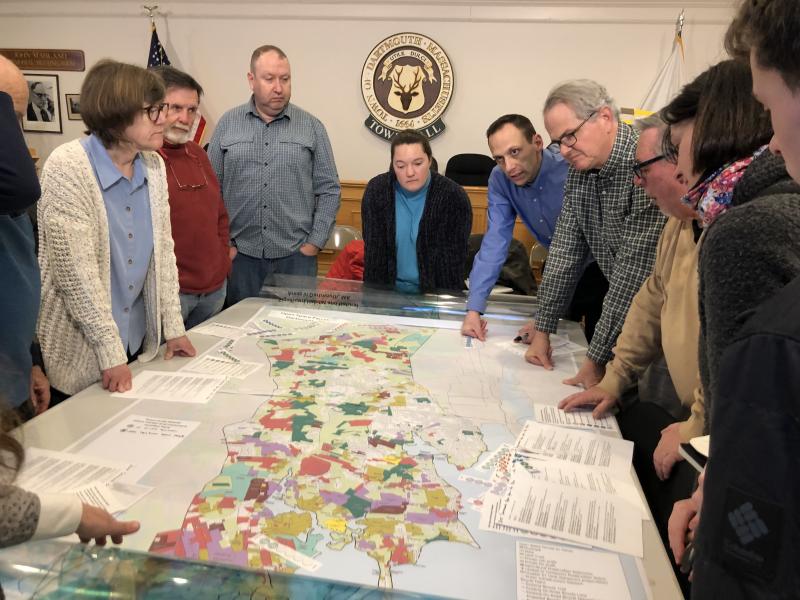Residents want more recreational facilities, farmland protection, and open space
An intergenerational recreation center. Sidewalks town-wide. More crosswalks. A skatepark. Bike paths. Farmland protection.
Those were just some of the hundreds of ideas Dartmouth residents pitched for inclusion in the town’s under-development Master Plan at a workshop on January 29.
The Town of Dartmouth Master Plan, currently in development by the town and the Southeastern Regional Planning and Economic Development District (SRPEDD) is a guiding document produced every decade to assess where the town is now, how it got here, and where to go from here.
The document will outline current data and trends, and suggestions for future action in ten key areas. SRPEDD has been holding workshops for residents to weigh in on each subject area since last year.
The January 29 meeting focused on natural and cultural resources and open space and recreation, and was by far the most well attended workshop to date.
Dozens of residents turned out to offer their input on the town’s recreation and resource needs. They included a strong showing of support from nearly every youth recreational sports league in town, with one message: The town needs an intergenerational recreation center for all ages.
Board members and parents say the groups are feeling a spacing squeeze especially hard this year.
Groups like the Dartmouth Girls Athletic League and Dartmouth Youth Activities Association use school gymnasiums and fields to host practices and games, but increased demand for school programming has caused a shortage of available facility space. Some of the groups had even put money into improving school facilities that are no longer available to play on.
“DGAL, DYAA, they’re at the mercy of the schools,” said James Vieira from the DYAA and Parks Board. “[A recreation center] is one of our tops needs for this town.”
Parks Director Tim Lancaster attended the meeting, and noted the town is beginning to lay the groundwork for a possible town-owned recreation center.
At the 2019 Fall Town Meeting, members approved $45,000 to fund a feasibility study into the idea. Lancaster said the study was put out to bid several months ago, and a contractor to conduct the study will be picked this week.
Once the study is completed, it will outline needs and paths forward should the town decide to proceed.
In other parks-related ideas, residents pitched improvements at the Russells Mills Landing, repaving and more parking at Round Hill Beach, and bringing more uses to the Parks Department’s North Dartmouth trails facility.
Dartmouth’s agricultural community was also represented at the workshop. During the workshop, those in attendance could complete a “mapping exercise.” Attendees were encouraged to mark areas for improvement down on a large map of the town.
Fred Dabney placed a “Preserve Farmland” pin on many of the remaining farms in Dartmouth which are not under permanent protection. While some have permanent protection from development, others are under Chapter 61, which can be taken out of protection.
The farmer and member of the Agricultural Commission noted protecting farmland is a top priority.
“We want to develop a priority list of farms at risk for development,” Dabney said.
He listed off several farms which are up for sale right now as a worrisome trend in town. Part of the preservation component of the Master Plan could address adding more farmland to the state Agricultural Preservation Restriction (APR) program, which offers farm owners financial incentives to permanently protect prime agricultural farmland.
Fans of Dartmouth’s coastline were also in attendance to pitch ideas to improve recreation in Buzzards Bay and along the town’s rivers. Focusing on Padanaram, residents recommended everything from a fishing pier to dredging in the harbor.
Residents also said they want to see more bike paths and better pedestrian access throughout town. There is a plan to build a bike path through the northern end of Dartmouth, but residents also noted the need for sidewalks, bike paths, and other pedestrian and bike-friendly improvements in South Dartmouth.
Officials from the Dartmouth Natural Resources Trust recommended efforts to protect Dartmouth’s coastal resources along the oceanfront and rivers.
All of the ideas will be combined and incorporated into the town’s Master Plan. Although actually implementing them all will be up to the town, SRPEDD’s Helen Zincavage explained putting them down on paper in a Master Plan now will make applying for grants and state funding easier in the future.
More public workshops to address the other issues in the plan are scheduled in the coming months. The next workshop will focus on the Climate and Resiliency topic area, and will be held in March.
Visit srpedd.org/Dartmouth-Master-Plan for more information about the master planning process.














